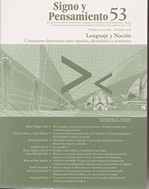Abstract
This article takes a critical look at the discursive and hegemonic relationships that work behind the production of what is understood as the representation of the nation; that is, a social, symbolic, and discursive construct. In this sense, it raises issues such as power, perspective, exclusion, conflict, and struggle which play a role when building or defining what should be understood as “national”.
Anderson, B. (2005), Comunidades imaginadas, México, Fondo de Cultura Económica.
Bhabha, H (2000), “Narrando la nación”, en Álvaro Fernando Bravo (ed.), La invención de la nación, Buenos Aires, Manantial.
Burns, B. (1990), La pobreza del progreso. América Latina en el siglo xix, México, Siglo Veintiuno Editores.
Cadelo, A. (2001), Hábito e ideología criolla en el Semanario del Nuevo Reino de Granada [trabajo de grado], Bogotá, Facultad de Comunicación y Lenguaje, Pontificia Universidad Javeriana.
Foucault, M. (1999), Estrategias de poder, Barcelona, Paidós.
— (2001), Defender la sociedad, México, Fondo de Cultura Económica.
— (2005), El orden del discurso, Barcelona, Fábula Tusquets Editores.
Gnecco, C. y Zambrano, M. (2000), Memorias hegemónicas, memorias disidentes, Bogotá, Instituto Colombiano de Antropología e Historia (ICANH).
Heidegger, M. (2001), Caminos de bosque, Madrid, Alianza.
Laclau, E. y Mouffe, C. (2006), Hegemonía y estrategia socialista. Hacia una radicalización de la democracia, Buenos Aires, Fondo de Cultura Económica.
Martín-Barbero, J. (2005, 22 de agosto), “Relatar la nación, imaginar la ciudadanía, reinventar la política” [audio], en Política cultural y relatos de nación: una escucha de la comunicación a la política, la historia y la cultura, Bogotá, Pontificia Universidad Javeriana.
Mouffe, C. (1999), El retorno de lo político, Barcelona, Paidós. Nietzsche, F. (1974), Aurora, Medellín, Bedout.
— (1984), Humano demasiado humano, Medellín, Bedout. — (1997), Fragmentos póstumos, Bogotá, Norma.
Quijada, M. (2008), “¿Qué nación? Dinámicas y dicotomías de la nación en el imaginario hispanoamericano del siglo XIX” [en línea], disponible en: http://www.ahila.nl/publicaciones/cuadernos.html.
Renan, E. (2000), “Qué es la nación”, en Álvaro Fernando Bravo (ed.), La invención de la nación, Buenos Aires, Manantial.
Uribe, M. (2005, 22 de agosto), “Relatos de nación: ciudadanías mestizas y voces subalternas en el proyecto de la civilización o de la nación colombiana” [audio], en Política cultural y relatos de nación: una escucha de la comunicación a la política, la historia y la cultura, Bogotá, Pontificia Universidad Javeriana.
This journal is registered under a Creative Commons Attribution 4.0 International Public License. Thus, this work may be reproduced, distributed, and publicly shared in digital format, as long as the names of the authors and Pontificia Universidad Javeriana are acknowledged. Others are allowed to quote, adapt, transform, auto-archive, republish, and create based on this material, for any purpose (even commercial ones), provided the authorship is duly acknowledged, a link to the original work is provided, and it is specified if changes have been made. Pontificia Universidad Javeriana does not hold the rights of published works and the authors are solely responsible for the contents of their works; they keep the moral, intellectual, privacy, and publicity rights.
Approving the intervention of the work (review, copy-editing, translation, layout) and the following outreach, are granted through an use license and not through an assignment of rights. This means the journal and Pontificia Universidad Javeriana cannot be held responsible for any ethical malpractice by the authors. As a consequence of the protection granted by the use license, the journal is not required to publish recantations or modify information already published, unless the errata stems from the editorial management process. Publishing contents in this journal does not generate royalties for contributors.


